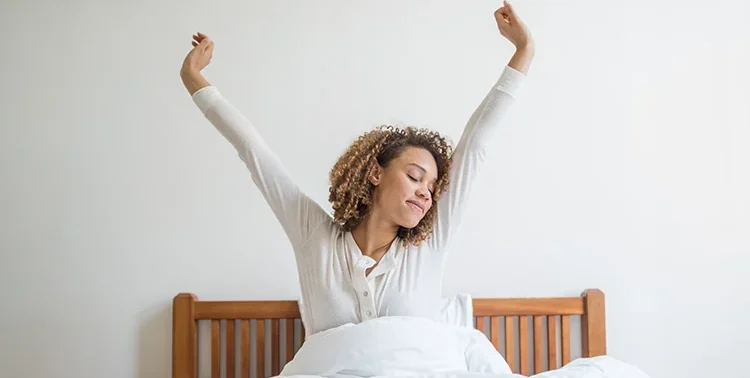
1. Make time to relax
Read a book, take a warm bath, listen to your favourite soothing music or write a mind-easing checklist to free yourself of worries for the day to come. Dedicating time to such activities helps you move from your daily productivity-focused routine into a more peaceful and relaxed state of mind.2. Get into a routine
Humans are creatures of habit and our bodies have the potential to be finely tuned machines. A lack of routine alongside other variables can influence our biological clock which is crucial for our general wellbeing and sleep. We actually have multiple little cycles going on in our body like our circadian rhythm, which is particularly important in balancing wakefulness and sleep. Often enough, this can be thrown off by variables like:- Jet lag
- Shift work
- Advanced or delayed sleep timing
- Artificial light exposure
- Fluctuating sleep hours
- Behaviour choices
- Caffeine and energy drinks
- Stress and emotional difficulties
3. Avoid technology
Set a hard and fast rule to keep screens out of the bedroom. The TV, mobile phones and all our screenful and blue light-emitting technology have no place in the bedroom. While checking what your friend’s dog did today on Instagram stories and catching up with the latest Netflix series is fun before sleep, it might not be worth the consequences – compromised sleep.
4. Create a restful environment
Make sure you create a soothing space that oozes relaxation and rest. Start by making sure you have a supportive bed and mattress to ensure proper posture and comfort during the night. Think about the little details like the temperative and scent of the room. 16 °C -18 °C is considered optimal while scents of lavender and geranium can help to create a soothing atmosphere5. Don’t clock watch
This is similar to being anxious about anxiety. Worrying about a lack of sleep and constantly checking the clock to measure the exact minutes you are going to sleep can be counterproductive. Such thoughts can hinder your ability to sleep by causing you to overthink and making the problem even worse.6. Foods for sleeping
You hear it once, twice and probably are fed up of hearing it, but, eating healthy can improve our lives in many ways, including helping us to sleep better. Some foods are particularly beneficial for sleep, namely, those that include tryptophan and serotonin which are vital for the production of melatonin, the hormone that promotes sleep. Some helpful foods include:- Kiwi
- Tart Cherries and Tart Cherry Juice
- Milk
- Fatty Fish
- Nuts
- Rice
7. Foods to avoid
Try to avoid spicy food, alcohol and large meals before bedtime. Many also find that drinking coffee and caffeinated drinks in the afternoon can affect sleep negatively. The same goes for sugary food. Consuming sugar causes an energy spike and subsequent crash that can disbalance your body clock. Also, research has shown that, if you don’t sleep well, you tend to turn to junk food the next day, creating a cycle of poor sleep and a bad diet.8. Darkness promotes sleep
Remember the time when we relied on the sunrise to get up and the darkness of the night to go to sleep? Me neither. This is the case for our predecessors who didn’t have all the technology we have today and lived a lifestyle that differs from the hyper-speed routines of today. A darkened room can help you sleep and dimming the lights will make you feel sleepy. If you don’t have a dimmer switch, an inexpensive bedside lamp with dimmers could be a good option to set the mood for sleep. If light pollution sources still affect you at 6 am, try heavier curtains to reduce the impact on your sleep and try to get as much undisturbed sleep as possible.9. Keep fit and get active
 Physical activity is great for sleep, as well as for your general health. However, some people find that if they do vigorous exercise less than two hours before bedtime, it can make it harder to get to sleep. If you don’t find this a problem, then there’s probably no need to change.
People spend a lot of time and effort exercising and making sure they eat healthily – which is great – but they forget sleeping, which is the third pillar of wellness.
Physical activity is great for sleep, as well as for your general health. However, some people find that if they do vigorous exercise less than two hours before bedtime, it can make it harder to get to sleep. If you don’t find this a problem, then there’s probably no need to change.
People spend a lot of time and effort exercising and making sure they eat healthily – which is great – but they forget sleeping, which is the third pillar of wellness.
10. Focus on sleep quality
It’s not the first time you’ve heard it, but it applies to sleep. Quantity is important but sleep quality is just as, if not more significant. A high-quality mattress set on the right bed can greatly impact your sleep. For this reason, we recommend shopping for mattresses at professional stores where you will be allowed to try out various mattress collections and find the right support for your body.Read more about the topic: How to Reset Your Sleep Routine | Sleep Foundation Successful aging: 10 tips for better sleep – Harvard Health